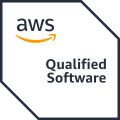OUR JOURNEY TO AWS CERTIFICATION: LESSONS LEARNED
A WEBINAR FOR C-LEVEL EXECUTIVES AND TECH LEADS ON OUR JOURNEY FROM IDEATION TO AWS QUALIFIED SOFTWARE CERTIFICATION
We are pleased to announce that CLOUD CONTROL SOLUTIONS INC has achieved AWS Qualified Software Solution certification. With this success, we are well-positioned as an AWS partner to assist customers in transitioning from traditional infrastructure to true cloud infrastructure.
It all started three years ago when we had a bold idea to create software that could revolutionize cloud migration and modernization. We thought it was crazy at first, but as time went on, our ambition only grew, and soon enough, we were ready to take on the challenge of becoming an AWS-Qualified Software.
So with some hard work and dedication, we embarked on our journey toward success. We looked for opportunities to gain experience in the field, read up about best practices from experts in the industry, and consulted mentors who provided valuable insight into what was needed to become an AWS ‘Qualified Software’ vendor in the marketplace.
Throughout this period of learning and experimentation, there were plenty of obstacles along the way which threatened to derail us from reaching our goal. But despite these hurdles, we persevered until finally, after three long years – here we are!
Rejith Krishnan, CEO, and CO-FOUNDER, of CLOUD CONTROL SOLUTIONS, is hosting a webinar with JOANNA KUBINSKA, CLOUD SPECIALIST, MAXIMA CONSULTING, to share Our Journey to AWS Certification and Lessons Learned to Achieve AWS Qualified Software Badge. This webinar is not just a celebration of what has been achieved so far but also an opportunity for others looking to make their mark in cloud computing by taking advantage of Amazon Web Services (AWS).
THE IDEA BEHIND BRINGING A UNIQUE SOLUTION
Rejith Krishnan, CEO and CO-FOUNDER of CLOUD CONTROL SOLUTIONS, comes from an enterprise background, having worked for the large Enterprise Fitech for close to 20 to 23 years and the past 10 years as an Enterprise Cloud Architect, gaining a lot of experience in bringing the cloud solution with complete self-service to the enterprise. After resigning from the company, he realized that the cloud is a challenge for large enterprises, and he subsequently discovered that it is also true for startups. With Kubernetes, cloud technology is gaining popularity. If we start learning from the industry that Kubernetes has a lot of advantages, we can use that knowledge to develop Software to manage Kubernetes.
As cloud technology evolved, and Kubernetes is now the second largest developer community, just behind Linux, businesses want to adopt the cloud whenever new technologies emerge and no longer desire VMs. As a result, every organization is attempting to leverage new technologies and seize the chance. After some time, Rejith and the team realized there was a need to establish a company and spent seven months coding and holding brainstorming sessions before registering the business and moving forward with better development.
Advantages of Kubernetes
- Increasing agility:
Kubernetes is critical in ensuring that the storage resources needed by these apps are accessible on the cluster nodes where they execute. In addition, Kubernetes improves developer agility by removing the need to manually set up storage resources on each individual server and shifting storage around as application pods are rescheduled.
- Reduce Risk:
Although containers provide speed, portability, and the use of microservices architectures, they may also introduce security blind spots and expand your attack surface. In addition, maintaining proper insight into your cloud-native infrastructure components gets increasingly challenging as more containers are deployed.
- Reduce costs:
Kubernetes can help enterprises save costs on ecosystem maintenance while maintaining scalability across many environments through dynamic and intelligent container administration. While low-level manual tasks on the infrastructure are significantly reduced, resource allocation is automatically tuned to the actual application demands.
CLOUD CONTROL JOURNEY INTO THE AWS MARKETPLACE
When the team evaluated the product, they started with a primary use case of deploying something to Kubernetes, ensuring the transition for legacy apps, and adding additional tools. The company also began to look into talents for deploying to environments without Kubernetes and the necessity for a Container or Docker professional. The aim was to build a fundamental tool, a basic approach to resolving issues, and it took the team more than a year to finetune everything before figuring out market strategies, connecting with known people, presenting them the demo of the product, and eventually starting to get clients in 2020.
The team wanted to make the product self-service, so they researched and discovered the AWS marketplace. The team contacted them, and they were beneficial; they started working on the process soon after.
Our product went through stringent quality testing from AWS team. We have compiled with the AWS best practices and standards which they had for products in the marketplace. The product had a fully automated install which made the job challenging. Finally after thorough review and testing AWS approved the product and gave a “Qualified Software” badge.
ADVANTAGES FOR CUSTOMERS WITH CERTIFICATION
We all know that an AWS badge contributes a lot of credibility to applications. However, the most significant advantage is that it is listed as Qualified Software, which means that it has been tested and certified to receive a certification badge after listing AWS. Being certified Software implies that they are operating following their specifications and security. Customers also have the advantage of having a single payment mechanism for the software consumed from AWS. Customers are billed through AWS which improves the ease of administration and payment for the service as well.
Download our brochure and the webinar deck here:


